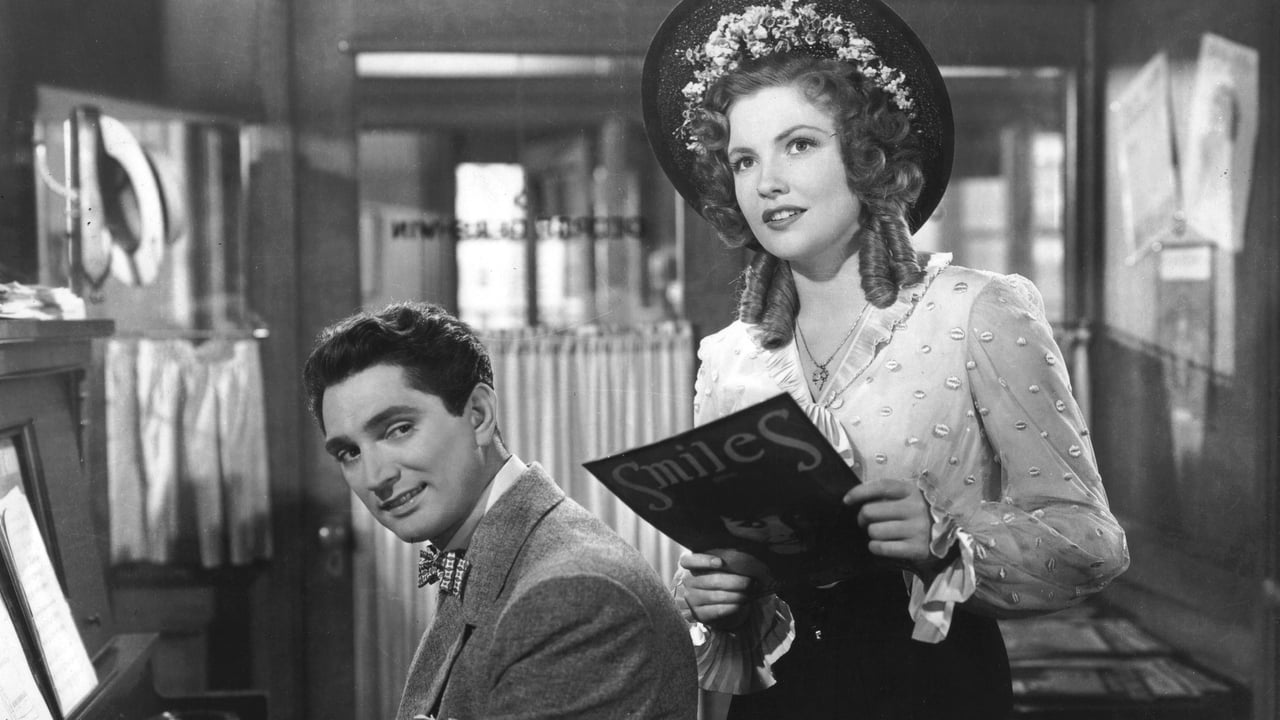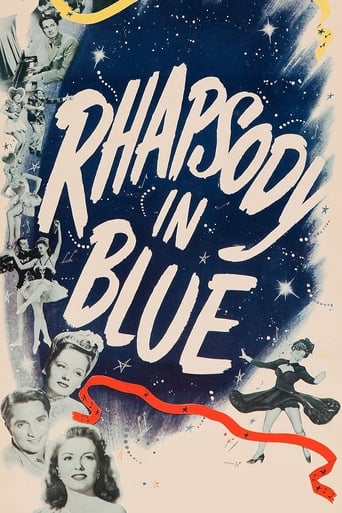

Better Late Then Never
... View MoreBest movie ever!
... View MoreThis story has more twists and turns than a second-rate soap opera.
... View MoreGreat story, amazing characters, superb action, enthralling cinematography. Yes, this is something I am glad I spent money on.
... View MoreDirected by Irving Rapper, with a screenplay co-written by Howard Koch and Elliot Paul from Sonya Levien's story, this fictionalized biography of George Gershwin captures the spirit of the great composer's passion and features much of his varied music, including the titled composition. Robert Alda (father of Alan) plays Gershwin (in his film debut), Herbert Rudley plays his brother Ira. Joan Leslie and Alexis Smith play women in his life, Charles Coburn plays the music publisher who discovered him while Albert Bassermann plays the music teacher he most respected. Oscar Levant plays himself, a friend of the Gershwins, whose parents are played by Morris Carnovsky and Rosemary DeCamp. Julie Bishop plays Ira's wife. Conductor Paul Whiteman, singer Al Jolson, producer George White, pianist Hazel Scott, and singer Anne Brown play themselves.The film, which was actually shot in 1943 and sat on the shelf due to the backlog of war and escapist films being released at that time, received Oscar nominations for its Score and Sound Recording.Though Momma Rose (DeCamp) buys her boys, George (Mickey Roth) & Ira (Darryl Hickman) Gershwin, a piano for their New York (The Bronx) apartment above the family grocery store, to give it class, it is Poppa Morris (Carnovsky) who enables George to pursue his obvious gift. Through the years, George moves from one music instructor to another until he finally works under the tutelage of Professor Franck (Bassermann). Around the age of twenty, George (Alda) briefly plays relief piano for Chico Marx before he finds himself hawking "free to performers" Remick music for tone-deaf manager Mr. Kast (Charles Halton), during which time he meets wannabe singer Julie Adams (Leslie). When he's fired by Kast for playing the music he'd written himself, he finds himself in the waiting area of Harms Inc., run by music publisher Max Dreyfus (Coburn), with Oscar Levant, who's also trying to see the publisher. Dreyfus likes Gershwin's song Swanee so much, he hires him for $35/week and phones Al Jolson, who makes it a smash hit in his show at the Winter Garden ("Sinbad").Gershwin enjoys great financial success with hit after hit, but his discussions with Franck, who talks of Schubert, Wagner, Beethoven and Brahms, make him feel that he's missing something. He writes a musical for Julie called "Half Past Eight" which features S Marvelous, but it bombs. George says that he doesn't have time for failures and, for the rest of his life, drives himself relentlessly to create and explore new areas of music. His father now owns a Turkish bath, and Ira is starting to write lyrics.In the bath, George meets a friend of Dreyfus's named George White, who produces an annual string of musical comedies called "Scandals" with Gershwin's songs. Poppa marks his son's success by the length of the songs he writes. George continues to experiment, but has another temporary setback when he tries to write blues music. George learns that Ira is to marry Lee (Bishop) during a dinner in which Dreyfus and Franck "debate" the best use of George's talent; Levant and Julie are also in attendance. Conductor Paul Whiteman recognized George's capacity for the blues and takes him to Aeolian Hall where lots of famous persons (including Will Wright as Rachmaninoff) hear his "Rhapsody in Blue" concert. It is well received but Professor Franck, who was unable to attend due to illness, dies which tempers George's enthusiasm.George decides to go to Paris, intending to study per Professor Franck's wishes. However, in a nightclub he hears Hazel Scott play & sing his music and then meets Christine Gilbert (Smith). She is an artist herself, a painter, and they have some good times together. She introduces him to Ravel (Oscar Loraine) of Bolero fame and soon learns that George is consumed by his music. Still, she returns with him to an unexpected "welcome home" party in New York where she and, the waiting, Julie are made to feel unimportant by George's egocentric attention to his gift, at Levant's expense as well. After singing Embraceable You, Julie runs out on George and soon, after giving him a dog, so does Christine. George returns to Paris and writes "An American in Paris".George returns home in time to see his father die of leukemia. Based on his father's dying words, George finds Julie in Miami, but she pretends to be engaged to her bandleader; she refuses to come between him and his talent. He completes his opera "Porgy and Bess", starring Anne Brown, which earns praise from Dreyfus even if it receives mixed reviews. George, Ira, and Oscar travel to Los Angeles by train, but George's health is failing. He experiences splitting headaches to go along with his heartbreak. He has a brief recovery when he hears that Julie will come to be with him, but he dies as Oscar is playing a concert back in New York. The film ends with a concert of Gershwin's music, being played in his honor.
... View MoreIn a working class New York City neighborhood, young Mickey Roth (as Little George Gershwin) and young Darryl Hickman (as Little Ira Gershwin) arrive home and are excited to see a piano being delivered to an apartment in their building. Brother Ira is inexplicably unsure if the piano is for their family, making him very likely the only boy in the Bronx who is unable to pick out his window from the street. Fortunately, the Gershwin brothers are bright in other areas. They quickly grow up to become Robert Alda (as George Gershwin) and Herbert Rudley (as Ira Gershwin). The focus turns almost exclusively on Mr. Alda, who essays a successful career as a pianist and composer. There are hit songs and Broadway shows, but romance is elusive...Like most Hollywood film biographies, "Rhapsody in Blue" takes some facts about a subject's life and fleshes them out with fiction. This story is best during Irving Rapper's well-directed opening and exciting closing sequences; other than that, the movie version of Gershwin's life is a colossal bore. However, the music is excellent. Many of the composer's greatest hits are heard. Legendary entertainer Al Jolson and conductor Paul Whiteman appear, with new versions of their #1 Gershwin hits "Swanee" and the title song. We also see original "Porgy and Bess" stage performer Anne Brown, and many others...Oscar Levant plays himself exceptionally well...This was the debut film for Alda, from success in musical theater; presently, he is more famous as the father of former "M*A*S*H" TV favorite Alan Alda. Robert Alda and Herbert Rudley do slightly resemble George and Ira Gershwin, especially in their scenes together. The filmmakers decided to focus on little brother George and his, at the time, significantly more dramatic life. A better idea might have been to tell both brothers' story as their relationship is the most interesting and engaging in the film. Rudley gets a lot of screen time, but is too often kept on the sidelines. The romances are ordinary and dull.****** Rhapsody in Blue (6/27/45) Irving Rapper ~ Robert Alda, Herbert Rudley, Oscar Levant, Joan Leslie
... View MoreThe music, of course, is a treat. What a florescence of vernacular music America experienced between 1920 and 1955. Not just Gershwin but Irving Berlin, Jerome Kern, Harry Warren, and a dozen others whose tunes have become part of a sort of golden songbook.This black-and-white précis of George Gershwin's brief life manages to squeeze in quite a few tunes, as well as some of his more ambitious work. And they're well done. Oscar Levant plays the piano and Oscar Levant. He's great, pustular with humor.If we're to believe the biographical part, or even part of the biographical part, Gershwin really got around in musical circles -- meeting such stars of the classical world as Ravel and Milhaud.The family part, indulgent father, practical mother, also passes muster. Somewhere along the line, though, we get Gershwin's approach/approach conflict with honest and loving showgirl Joan Leslie, on one side, and neurotic, artist manqué and socialite Alexis Smith on the other. It seems to me I've heard that song before. We can hear a different version in "Young Man With a Horn". And if we replace adoring Joan Leslie here with adoring Mamma, we get "The Benny Goodman Story." It's a strict Hollywood product. Music aside, there's hardly an original note in this movie, not even the "diminished seventh" that Gershwin's first publisher refers to, whatever it is. I'm more familiar with diminished fifths.
... View MoreThis film presents many Gershwin tunes in great fashion with several great settings and great production numbers. Yes, it's unfortunate that the story line is so heavily fictionalized and even misleading. But, the sets are honest to the periods covered, several sequences are very tastefully done and fun, the show excerpts are good, and did I mention the music? As several other commentators have indicated, the music is faithfully recreated in long segments that bring you much or all of the tune.If you come to this film to hear some wonderful Gershwin performed by some great artists staged with a lot of character and splash (my favorite set is Hazel Scott's Paris show), you won't be disappointed. The story line is simply a convenient string to tie together the thread of music.
... View More